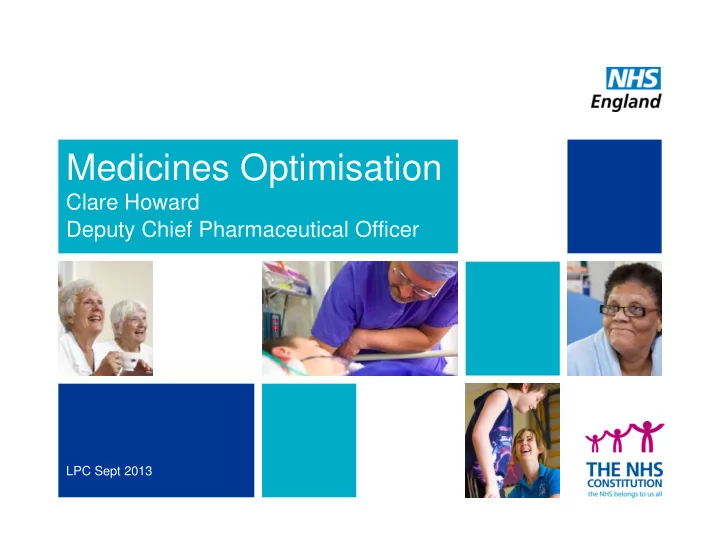

Medicines Optimisation Clare Howard Deputy Chief Pharmaceutical Officer LPC Sept 2013
What is our Mandate? Government sets annual objectives that NHS England are legally obliged to pursue, but NHS England is independent in pursuing those objectives NHS England is held accountable to the government against the achievement of those objectives, and the level of continuous improvement
What is NHS England? We are 6,500 people in new roles in national, regional, and local offices across England We create the culture and conditions for health and care services and staff to deliver the highest standard of care and ensure that valuable public resources are used effectively to get the best outcomes for individuals, communities and society for now and for future generations
What does NHS England do?
What is our vision? We believe that the NHS should support everyone to have greater control of their health and wellbeing, and to live longer, healthier lives by offering high quality health and care services that are compassionate, inclusive and constantly improving
We need to make this vision a reality, translating it into how patients care looks and feels
Domain teams priority action areas 1 1 • Maximising the contribution that the NHS can make to preventing disease • Finding the ‘missing millions’ and diagnosing earlier and more accurately Preventing people from dying Preventing people from dying • Treating people in an appropriate and timely way prematurely prematurely • Addressing unwarranted variation in mortality and survival rates • Reducing deaths in babies and young children 2 2 • Helping patients take charge of their care Enhancing the quality of life for Enhancing the quality of life for • Enabling good primary care people with long term people with long term • Ensuring continuity of care conditions conditions • Ensuring a parity of esteem for mental health 3 3 DOMAINS DOMAINS • Keeping people out of hospital when appropriate Helping people to recover from Helping people to recover from • Effective interfaces between primary, secondary and community care episodes of ill health or episodes of ill health or • High quality, efficient care for people in hospital following recovery following recovery • Co-ordinated care and support for people following discharge from hospital 4 4 • Improving our understanding of the patient experience • Reduce inequality in patient experience Ensuring that people have a Ensuring that people have a • Enabling commissioners and providers to create a culture that puts good positive experience of care positive experience of care patient experience and positive staff experience at the heart of services • Establishing clear lines of accountability for patient experience in the NHS 5 5 • Increase our understanding of the problem Treating and caring for people Treating and caring for people • Create the conditions for patient safety in a safe environment and in a safe environment and • Build capacity for safe care protecting from avoidable harm protecting from avoidable harm • Create a whole system response • Address our key patient safety concerns
Medicines Optimisation –The Policy Context •Put patients at the heart of everything the NHS does (“No Decision About Me Without Me”) •Focus on continuously improving those things that really matter to patients - the outcome of their healthcare •Empower and liberate clinicians to innovate, with the freedom to focus on improving healthcare services Specific extracts: The community pharmacy contract, through payment for performance, will incentivise and support high quality and efficient services , including better value in the use of medicines through better informed and more involved patients. Pharmacists working with doctors and other health professionals, have an important and expanding role in optimising the use of medicines and in supporting better health 8
Medicines Optimisation Principles
Recommend
More recommend